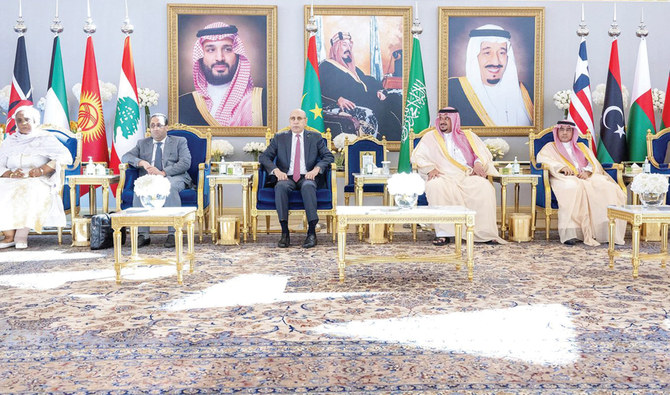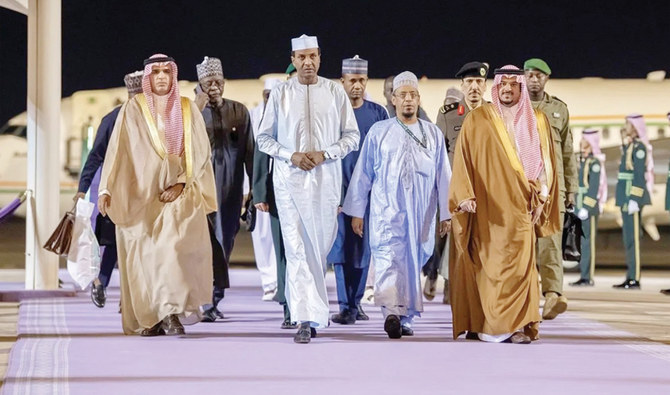DUBAI: Leaders from 50 nations throughout the Middle East and Africa will gather in Riyadh for the inaugural Saudi-African Summit on Nov. 10.
Saudi and African officials hope the meeting will lead to a long-term partnership between the Kingdom and the African Union, capitalizing on pre-existing economic, cultural, and diplomatic relations while setting out to forge new ones.
Separated by the narrow expanses of the Red Sea and the Gulf of Aqaba, the geographical proximity of Saudi Arabia and the African continent means they have a long history of shared cultural and linguistic ties that pre-date the birth of Islam.
“Africa and Saudi Arabia share a common geography, common culture, and common traditions,” Yahaya Lawal, the Nigerian ambassador to Saudi Arabia, told Arab News.
“We are bound together by history. Islam spread to Africa. Saudi Arabia and Africa are bound together through Islamic culture and tradition.”
Formal ties were first established between the Kingdom and several African nations in the 1960s, when they secured independence from European colonialism.
Lawal said: “Our relations have been growing ever since. Saudi Arabia is a very important partner for us.”
INNUMBERS
- 50 world leaders from the Middle East and Africa will meet in Riyadh.
- $13.5bn — the sum provided to 54 African nations by the Saudi Fund for Development.
During a ceremony to celebrate Africa Day in May this year, Waleed bin Abdulkarim El-Khereiji, the Saudi vice minister of foreign affairs, said the Kingdom recognized the need to support the development of African nations.
Since its establishment in 1974, the Saudi Fund for Development has provided 580 loans and grants with a total value of approximately $13.5 billion to more than 54 African countries.
The Kingdom currently enjoys diplomatic relations with 54 African countries, operates 31 resident missions, and is working on opening 13 further missions in the near future, El-Khereiji added. A further range of projects, loans, and grants worth more than $800 million are also in the pipeline.
The Arab world consists of 22 countries, of which 10 are in Africa — Comoros, Somalia, Djibouti, Sudan, Egypt, Libya, Tunisia, Algeria, Morocco, and Mauritania. These nations form an important cultural bridge between the continents.
“As a member of the Arab League and an African nation, both summits are important to us,” Dya-Eddine Said Bamakhrama, ambassador of the Republic of Djibouti to Saudi Arabia, told Arab News.
“The relationship between Africa and Saudi Arabia is not new,” he added, noting it had been “very strong” since the independence of Djibouti 40 years ago.
The first Saudi-African Summit aims to enhance political coordination between the Kingdom and the continent, fostering joint action, economic development, and investment cooperation.
Bamakhrama said: “This summit has long been awaited by African nations.”
The fifth Arab-Africa Summit, which was planned to take place on Nov. 11 after a seven-year hiatus, has been postponed. A statement said this was due to the Israel-Hamas war in Gaza and a commitment to prevent regional political events from impacting the Arab African partnership focused on developmental and economic dimensions. The summit was originally scheduled for 2020 but was postponed due to the coronavirus pandemic. Its new date has yet to be announced.
The fourth Arab-Africa Summit took place in November 2016 in Malabo, Equatorial Guinea. It concluded with the endorsement of the Malabo Declaration, with Arab and African countries pledging to enhance cooperation in areas of sustainable development, security, and peace.
“Riyadh is now one of the most important capitals in the Middle East region and in the world. To have these two summits side by side in Riyadh is very important for all African countries,” Bamakhrama added.
The Islamic Development Bank, or IsDB, established in Jeddah in 1975, has long financed projects in Africa. It provides loans and credit to member countries to support the development of both social and physical infrastructure. Among its 57 member countries are 27 African nations.
From 1975 to June 2022, the IsDB has advanced financing worth approximately $65 billion to African countries, including $20 billion for trade financing activities as well as energy, education, health, and road transport projects.
On May 25, the African Union celebrated its 60th anniversary. Upon its creation it set out to liberate the continent from colonialism, strengthen African solidarity, eliminate economic underdevelopment, and elevate the continent in international decision-making.
Six decades later, while much work still needs to be done, the continent is on the rise and has immense economic potential. Covering an area larger than China, Europe, the US, and India combined, Africa also has the world’s youngest and fastest-growing population.
According to the UN, by 2050 one in four people will be African. While birth rates are declining in richer nations, Africa’s population is expected to double to 2.5 billion over the next 25 years.
Africa’s youth is bursting with new ideas, eager to jumpstart initiatives and work across a variety of sectors. The continent’s cities are also rapidly expanding, creating space for new markets and industries.
Saudi Arabia has been quick to recognize Africa’s potential for increased economic, social, and political partnerships, and African officials are eager to encourage investment.
“These two summits are quite significant because they’ll bring and solidify the existing bridges that have always existed between the Arab Peninsula and the African continent,” Lawal said.
It is not just trade and investment that will feature on the agenda at the forthcoming summit. Security issues, including regional conflicts and extremist insurgencies, are also a source of shared concern.
“We have common challenges to discuss. I believe we will discuss many of our issues during the summits. Saudi Arabia has always been a great partner and is already pursuing mediation initiatives in several African conflicts,” Lawal added.
Saudi Arabia has been involved in brokering talks between the Sudanese Armed Forces and the paramilitary Rapid Support Forces, which plunged Sudan into violence and humanitarian catastrophe in April.
Since the war broke out more than six months ago, several rounds of talks have been held in Jeddah to establish a ceasefire and to allow for the delivery of humanitarian aid. The US and Saudi-sponsored talks, together with the African Union, restarted on Oct. 30.
“The Kingdom is not only contributing to peace initiatives and to resolving conflicts but also to the development of Africa,” Lawal said.
Stability and development will be key to unlocking Africa’s full potential. But to equip young Africans with the tools they need to transform their societies, investment is needed in educational programs — which is why the issue will feature on the summit agenda.
Bamakhrama said: “Without education you can’t understand the world we live in. Education is vital for the development of Africa.”
Staging the twin conferences sends a strong signal to the African continent that Saudi Arabia is committed to building upon its existing relationships and identifying new ways to forge a common vision for development.
“There is already important Gulf Cooperation Council investment in Africa. Through these summits we will be able to deepen our cooperation and make our investments stronger and more practical,” Bamakhrama added.



























